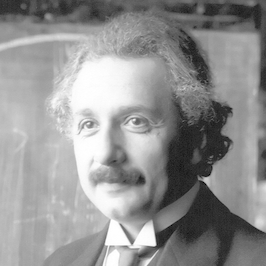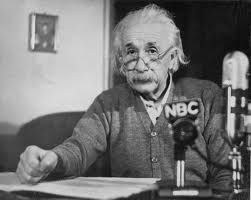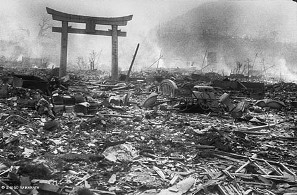 |
| Albert Einstein (http://tomlarsen.org/wp-content/uploads/2012/10/Ei ()) |
Albert Einstein once said that character not intelligence is what defines a great scientist, but both defined him. While most people know him for his theories, very few know about the man behind the image. Einstein was born in Ulm, Germany, on March 14, 1879. For much if his young life, he was unable to speak clearly, which made those close to him believe he was retarded. The first schools he went to had very strict rules and encouraged long memorization sessions. Einstein developed a hate for learning these learning "factories", which heavily influenced the rest of his life. Einstein blossomed during his collegiate years in Sweden, due to his school's open learning environment. In 1905, also known as Einstein's "Miracle Year”, he published a collection of four papers that revolutionized physics. Einstein received a Nobel Prize in 1921 for a paper on the Photoelectric Effect. After he settled in the United States in 1932, he became a voice for those who were falsely persecuted, such as African Americans and German Jews. He was considered the epitome of scientific excellence when died in Princeton, New Jersey, on April 18, 1955. However, Einstein's plethora of accomplishments is not what makes him a hero. Einstein is considered heroic because of his character. He always did what he thought was right, regardless of the consequences or how it would reflect on him. Like Polaris beaconing early mariners, Einstein's humility, bravery, and finely tuned moral compass guide today's scientists.
 |
| Einstein's Humble Abode |
Einstein believed he was no smarter than any other person and was amazed when other people called him a genius. He thought of himself as a normal person without any "special talents". As he wrote: Let every man be respected as an individual and no man idolized. It is an irony of fate that I myself have been the recipient of excessive admiration and respect from my fellows through no fault, and no merit, of my own"(“Albert Einstein” -Gale DISCovering Biography). "Admiration" is only gained when somebody does something extraordinary. Einstein received countless accolades for his brilliant theories and groundbreaking research, but believed they were just unnecessary distractions from his work. He gracefully accepted medal after medal and then stowed them away in his closet . He didn't want this "Fool's Gold" to distract him from his love of science. Einstein also believed that the countless scientists that came before him should receive part of the credit for his work. He said, “A hundred times every day, I remind myself that my inner and outer life are based on the labors of other men, living and dead, and that I must exert myself in order to give in the same measure as I have received and am still receiving”(Ideas and Opinions). Einstein felt the researchers that preceded him did not receive enough credit , and Einstein actually felt indebted to them. He believed that he had an unwavering duty to continue their research and prove their theories. He might have been a giant, but he acknowledged the shoulders he stood on. Through his complete humility, Einstein showed that a true hero goes for the eternal gold of knowledge, not the tarnishable silver of fame.
 |
| Einstein on a Radio Show |
Einstein proved that bravery is not just marching onto a battlefield but also being willing to speak up for you’re beliefs. No matter the situation, and regardless of the consequences, Einstein spoke his mind. During the early 1900s, “Einstein became a target of anti-Semitic criticism and even occasional death threats when he began speaking out on behalf of the Zionist movement and its demands for a Jewish homeland in Palestine”(Gale Contemporary Heroes). Einstein knew he was famous, and decided to use his influence to support a multitude of worthy causes. He was oblivious to other’s opinions about him, and most importantly, trusted himself. Armed with a shield of humility and a sword of self-confidence, he was ready for any threats that came his way. Einstein's greatest test came during the rise of the Nazis. In 1931, "the Nazi’s enlisted other physicists to denounce Einstein and his theories as "Jewish physics." ... Einstein also learned that his name was on a list of assassination targets, and a Nazi organization published a magazine with Einstein's picture and the caption "Not Yet Hanged" on the cover."(“Albert Einstein” - The Biography Channel). Due to his findings contradicting the Communist Party’s beliefs, Einstein was seen as an enemy. Even with the possibility of death looming over him, Einstein continued dispelling Hitler's lies and fighting for the truth. His summer house was plundered, but he continued to speak out. When it was no longer possible for him to stay in Germany, he moved to the USA, but continued his crusade against anti-Semitism. Joseph Gobbels, Hitler’s minister of propaganda, once said that if you tell people a lie often enough, they will believe it. But the Nazis underestimated the courage Einstein possessed, and were too late to stop him from tearing a hole in their silver screen.
 |
| Nagasaki after the bombing |
Einstein always did what he considered correct, and tried to atone for his mistakes. When he heard about the possibility of nuclear war, "Einstein signed a letter to President Franklin Delano Roosevelt (1882–1945), warning him of the possibility that the Germans might develop an atomic bomb. This letter led to the Manhattan Project" (“Albert Einstein” - Gale Biography in Context). While he did not know it, Einstein's signature convinced Roosevelt to go through with the project . The pacifist’s "e=mc^2" was used in the development of the world's deadliest weapon. However, Einstein signed the letter thinking the bomb would only be used against the Germans. He thought the possibility of an all-out war with a major power would terminate the Nazi’s nuclear development. When it was used for a completely different purpose than what he intended Einstein was appalled. During World War II, "Its use against the Japanese in August, 1945, horrified him. He later became chairman of the Emergency Committee of Atomic Scientists, a group that encouraged countries to focus on developing peaceful uses for nuclear energy" (“Albert Einstein” - Gale Contemporary Heroes). This is where Einstein was as his best - when his life was at its worst. After the Holocaust, The Germans built hundreds of memorials to remind them of what they had done. They recognized their mistakes. Einstein realized his oversight, was humble enough to admit it to the world, and brave enough to try to make amends. He started numerous organizations, signed countless petitions for the abolition of nuclear weaponry, argued at various conferences and wrote innumerable letters to world leaders. He was able to see the error of his ways and tried to repair the damage he caused. A hero doesn't have to be perfect - he just has to know he isn’t.
Even today, Einstein’s ideas and theories plot the course of physics. He was like a brave captain steering the ship of science through the violent storm of war. But to navigate rough waters, a captain has to to be down to earth, brave, and make sound decisions. Einstein had all of these characteristics and was able to traverse stormy seas without being led astray by the “pull of intelligence”. Too often the smartest of us develop a superiority complex. They believe that they are better than everyone else, and deserved to be treated accordingly. As Masashi Kishimoto put it,”Being skilled isn’t all that’s it’s made out to be. When you’re strong, you become arrogant and withdrawn.” It isn’t Einstein’s brilliance or myriad of awards that truly impresses me, it’s his behavior. He could have easily been proud, rude, fame driven and money-hoarding, but he made the choice to not loose himself. I love that about him. An essay of his “included this statement: "What I seek to accomplish is simply to serve with my feeble capacity truth and justice at the risk of pleasing no one" (“Albert Einstein” - Gale Biography in Context). Einstein still believed he was a normal person, not the god some celebrities act like. He had the same “capacity” as everyone else. He never tried to please people and wouldn't become a slave to their whims. I think that this is the true spirit of Einstein, the strength to not loose your ground because of the riptide of life. When I grow up, I don’t want to just be an intelligent coxcomb, admiring his gold medals through a handheld mirror. People like that sicken me. I want to be like Einstein, who walked away from the spotlight of fame and did what he loved. As Einstein aged, he may have become more famous, but he still stayed the same person on the inside. To him, fame and money were not the ultimate goals of life. As Steve Jobs put it, a real hero knows that “the journey is the reward.”
Work Consulted "Albert Einstein." Contemporary Heroes and Heroines. Vol. 2. Gale, 1992. Gale Biography In Context. Web. 9 Dec. 2012. "Albert Einstein." DISCovering Biography. Detroit: Gale, 2003. Gale Student Resources In Context. Web. 10 Dec. 2012. "Albert Einstein." St. James Encyclopedia of Popular Culture. Ed. Sara Pendergast and Tom Pendergast. Detroit: St. James Press, 2000. Gale Biography In Context. Web. 10 Dec. 2012. "Albert Einstein." 2012. The Biography Channel website. Dec 10 2012, 02:23 http://www.biography.com/people/albert-einstein-9285408. Einstein, Albert, and Albert Einstein. Ideas and Opinions. New York: Modern Library, 1994. Print.
Page created on 1/21/2013 12:31:46 AM
Last edited 1/21/2013 12:31:46 AM
